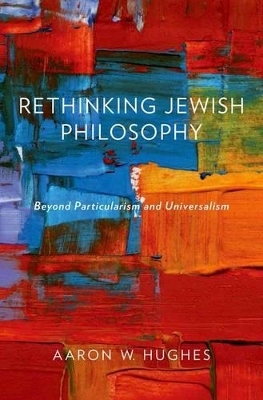
Rethinking Jewish Philosophy
Beyond Particularism and Universalism
Seiten
2014
Oxford University Press Inc (Verlag)
978-0-19-935681-2 (ISBN)
Oxford University Press Inc (Verlag)
978-0-19-935681-2 (ISBN)
Rather than assume that the terms "philosophy" and "Judaism" simply belong together, Aaron W. Hughes explores the juxtaposition and the creative tension that ensues from their cohabitation. He examines the historical, cultural, intellectual, and religious filiations between Judaism and philosophy.
Jewish thought is, in many ways, a paradox. Is it theology or is it philosophy? Does it use universal methods to articulate Judaism's particularity or does it justify Judaism's particularity with appeals to illuminating the universal? These two sets of claims are difficult if not impossible to reconcile, and their tension reverberates throughout the length and breadth of Jewish philosophical writing, from Saadya Gaon in the ninth century to Emmanuel Levinas in the twentieth.
Rather than assume, as most scholars of Jewish philosophy do, that the terms "philosophy" and "Judaism" simply belong together, Hughes explores the juxtaposition and the creative tension that ensues from their cohabitation, examining adroitly the historical, cultural, intellectual, and religious filiations between Judaism and philosophy. Breaking with received opinion, this book seeks to challenge the exclusionary, particularist, and essentialist nature that is inherent to the practice of something problematically referred to as "Jewish philosophy." Hughes begins with the premise that Jewish philosophy is impossible and begins the process of offering a sophisticated and constructive rethinking of the discipline that avoids the traditional extremes of universalism and particularism.
Jewish thought is, in many ways, a paradox. Is it theology or is it philosophy? Does it use universal methods to articulate Judaism's particularity or does it justify Judaism's particularity with appeals to illuminating the universal? These two sets of claims are difficult if not impossible to reconcile, and their tension reverberates throughout the length and breadth of Jewish philosophical writing, from Saadya Gaon in the ninth century to Emmanuel Levinas in the twentieth.
Rather than assume, as most scholars of Jewish philosophy do, that the terms "philosophy" and "Judaism" simply belong together, Hughes explores the juxtaposition and the creative tension that ensues from their cohabitation, examining adroitly the historical, cultural, intellectual, and religious filiations between Judaism and philosophy. Breaking with received opinion, this book seeks to challenge the exclusionary, particularist, and essentialist nature that is inherent to the practice of something problematically referred to as "Jewish philosophy." Hughes begins with the premise that Jewish philosophy is impossible and begins the process of offering a sophisticated and constructive rethinking of the discipline that avoids the traditional extremes of universalism and particularism.
Aaron W. Hughes holds the Philip S. Bernstein Chair of Jewish Studies in the Department of Religion and Classics at the University of Rochester.
Acknowledgements ; Preface ; Introduction: Occupation ; Chapter One: Impossibilities ; Chapter Two: Irreconcilability ; Chapter Three: Kaddish ; Chapter Four: Authoritarianism: A Case Study ; Chapter Five: Rosenzweig's Patient ; Chapter Six: Beyond ; Notes ; Bibliography ; Index
| Erscheint lt. Verlag | 24.4.2014 |
|---|---|
| Verlagsort | New York |
| Sprache | englisch |
| Maße | 236 x 163 mm |
| Gewicht | 386 g |
| Themenwelt | Geisteswissenschaften ► Philosophie ► Ethik |
| Geisteswissenschaften ► Philosophie ► Östliche Philosophie | |
| Geisteswissenschaften ► Religion / Theologie ► Judentum | |
| Sozialwissenschaften ► Soziologie ► Spezielle Soziologien | |
| ISBN-10 | 0-19-935681-5 / 0199356815 |
| ISBN-13 | 978-0-19-935681-2 / 9780199356812 |
| Zustand | Neuware |
| Haben Sie eine Frage zum Produkt? |
Mehr entdecken
aus dem Bereich
aus dem Bereich


